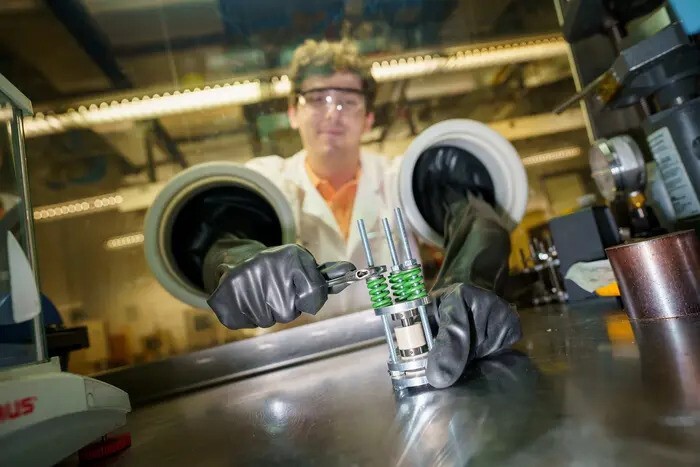

In a groundbreaking development, a team of researchers has successfully combined the most advanced battery technologies to create the world's first anode-free sodium solid-state battery.

This innovative design features a stable solid electrolyte and employs pressure to form dense sodium metal. An aluminium current collector ensures efficient and repeatable sodium plating and stripping at high capacities and speeds.
The implications of this new battery technology are significant. By eliminating the anode and using sodium—a cheap and abundant material—this battery is set to be more affordable and environmentally friendly than traditional lithium-based batteries. This advancement promises a future where energy storage is more sustainable and economically accessible.
Grayson Deysher, a PhD candidate at UC San Diego and first author of the study, said, “Although there have been previous sodium, solid-state, and anode-free batteries, no one has been able to combine these three ideas successfully until now.”
According to the team, this innovation can potentially develop cost-effective, rapidly charging, high-capacity batteries for electric vehicles (EVs) and grid storage.
Lithium is significantly scarcer than sodium, which constitutes 20,000 parts per million of the Earth's crust, but only around 20 parts per million. The growing demand for lithium-ion batteries in computers, phones, and electric vehicles has caused a notable price surge, making them increasingly unaffordable.
Sodium, however, is more abundant and commonly found in ocean water and soda ash mining. To address this, a team needed to innovate an utterly new sodium battery architecture to achieve an energy density comparable to lithium batteries, making the idea feasible.
During charging, conventional batteries store ions in their anodes. When the battery is in use, ions travel from the anode to the cathode (or current collector) through an electrolyte, providing power to cars and other devices.
Researchers have unearthed a potential game-changer in the world of battery technology with anode-free batteries. These batteries, which do away with the anode and directly deposit alkali metal onto the current collector, offer a range of potential benefits. This method of ion storage through electrochemical means, while not without its drawbacks, could lead to significantly increased energy density, reduced cell costs, and higher cell voltage, igniting excitement about the future of battery technology.
Deysher said, “Good contact must be made between the electrolyte and the current collector in any anode-free battery. This is typically very easy when using a liquid electrolyte, as the liquid can flow everywhere and wet every surface. A solid electrolyte cannot do this.”
Liquid electrolytes form a solid interphase, gradually depleting the active materials and diminishing the battery's effectiveness over time.
The team developed an innovative solution by designing a current collector that encircles the electrolyte, diverging from traditional methods. They utilised aluminium powder, which behaves like a liquid, to create the current collector. This powder was compressed under high pressure during battery assembly, forming a solid current collector while preserving its liquid-like contact with the electrolyte.
Researchers claim this method advances game-changing technology by enabling low-cost, high-efficiency cycling.
“Sodium solid-state batteries are usually seen as a far-off-in-the-future technology, but we hope that this paper can invigorate more push into the sodium area by demonstrating that it can indeed work well, even better than the lithium version in some cases,” said Deysher.
The team envisions a future where diverse, cost-effective batteries efficiently store renewable energy to meet society's needs.



Responses






